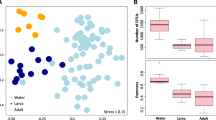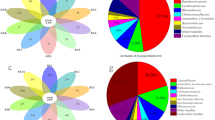Summary
Malaria remains a global health problem. The relationship between Plasmodium spp. and the gut microbiota as well as the impact of Plasmodium spp. on the gut microbiota in vertebrate hosts is unclear. The aim of the current study was to evaluate the effect of blood-stage Plasmodium parasites on the gut microbiota of mice. The gut microbiota was analyzed by 16S rRNA sequencing and bioinformatic analyses at three stages. The gut microbiota changed during the three phases: the healthy stage, the infection stage, and the cure stage (on the 9th day after malarial elimination). Moreover, the gut microbiota of these infected animals did not recover after malaria infection. There were 254 operational taxonomic units (OTUs) across all three stages, and there were unique strains or OTUs at each stage of the experiment. The percentages of community abundance of 8 OTUs changed significantly (P<0.05). The dominant OTU in both the healthy mice and the mice with malaria was OTU265, while that in the cured mice was OTU234. In addition, the changes in OTU147 were the most noteworthy. Its percentage of community abundance varied greatly, with higher values during malaria than before malaria infection and after malaria elimination. These results indicated that the external environment influenced the gut microbiota after host C57BL/6 mice were infected with blood-stage P. berghei ANKA and that the same was true during and after elimination of blood-stage P. berghei ANKA. In addition, we could not isolate OTU147 for further study. This study identified gut microbiota components that were reconstructed after infection by and elimination of blood-stage P. berghei ANKA in host C57BL/6 mice, and this process was affected by P. berghei ANKA and the external environment of the host.
Similar content being viewed by others
References
Yilmaz B, Portugal S, Tran TM, et al. Gut microbiota elicits a protective immune response against malaria transmission. Cell, 2014,159(6):1277–1289
Yooseph S, Kirkness EF, Tran TM, et al. Stool microbiota composition is associated with the prospective risk of Plasmodium falciparum infection. BMC Genomics, 2015,16(1):631
Villarino NF, LeCleir GR, Denny JE, et al. Composition of the gut microbiota modulates the severity of malaria. Proc Natl Acad Sci USA, 2016,113(8):2235–2240
Denny JE, Powell WL, Schmidt NW. Local and Long-Distance Calling: Conversations between the Gut Microbiota and Intra- and Extra-Gastrointestinal Tract Infections. Front Cell Infect Microbiol, 2016,6:41
Taniguchi T, Miyauchi E, Nakamura S, et al. Plasmodium berghei ANKA causes intestinal malaria associated with dysbiosis. Sci Rep, 2015,5:15699
Sugar NR, Schilling KA, Kim S, et al. Integrating household water treatment, hand washing, and insecticide-treated bed nets into pediatric HIV care in Mombasa, Kenya: impact on diarrhea and malaria Risk. J Acquir Immune Defic Syndr, 2017,76(3):266–272
You D, Wardlaw T, Salama P, et al. Levels and trends in under-5 mortality, 1990–2008. Lancet, 2010,375(9709):100–103
Diop SA, Dieye A, Ka D, et al. Malaria associated with bacterial infection in the department of infectious diseases at the National and University Hospital of Fann, Dakar. Mali Med, 2016,31(1):18–21
Prasad RN, Virk KJ. Malaria as a cause of diarrhoea—a review. P N G Med J, 1993,36(4):337–341
Reisinger EC, Fritzsche C, Krause R, et al. Diarrhea caused by primarily non-gastrointestinal infections. Nat Clin Pract Gastroenterol Hepatol, 2005,2(5):216–222
Ivanov II, Frutos Rde L, Manel N, et al. Specific microbiota direct the differentiation of IL-17-producing T-helper cells in the mucosa of the small intestine. Cell Host Microbe, 2008,4(4):337–349
Ivanov II, Atarashi K, Manel N, et al. Induction of intestinal Th17 cells by segmented filamentous bacteria. Cell, 2009,139(3):485–449
Mariat D, Firmesse O, Levenez F, et al. The Firmicutes/Bacteroidetes ratio of the human microbiota changes with age. BMC Microbiol, 2009,9:123
Long CA, Zavala F. Immune responses in malaria. Cold Spring Harb Perspect Med, 2017,7(8):a025577
Karl JP, Hatch AM, Arcidiacono SM, et al. Effects of psychological, environmental and physical stressors on the gut microbiota. Front Microbiol, 2018,9:2013
Pickard JM, Zeng MY, Caruso R, et al. Gut microbiota: role in pathogen colonization, immune responses, and inflammatory disease. Immunol Rev, 2017,279(1):70–89
Acknowledgments
The authors are indebted to the teachers and staff from the Department of Immunology, School of Basic Medicine, Tongji Medical College, Huazhong University of Science and Technology, Wuhan, China, and the staff from the Laboratory of Pathogenic Biology and Immunology, the Science Experiment Center in Hainan Medical College and the Hainan Provincial Key Laboratory of Tropical Medicine for their assistance in the study.
Author information
Authors and Affiliations
Corresponding authors
Additional information
Conflict of Interest Statement
The authors declare that they have no competing interests.
This work was supported by the Nature Science Foundation of Hainan Province (No. 817145), and College Student Innovation and Entrepreneurship Project (No. 201611810082; No. HYCX2015063).
Rights and permissions
About this article
Cite this article
Fan, Zg., Li, X., Fu, Hy. et al. Gut Microbiota Reconstruction Following Host Infection with Blood-stage Plasmodium berghei ANKA Strain in a Murine Model. CURR MED SCI 39, 883–889 (2019). https://doi.org/10.1007/s11596-019-2119-y
Received:
Revised:
Published:
Issue Date:
DOI: https://doi.org/10.1007/s11596-019-2119-y




